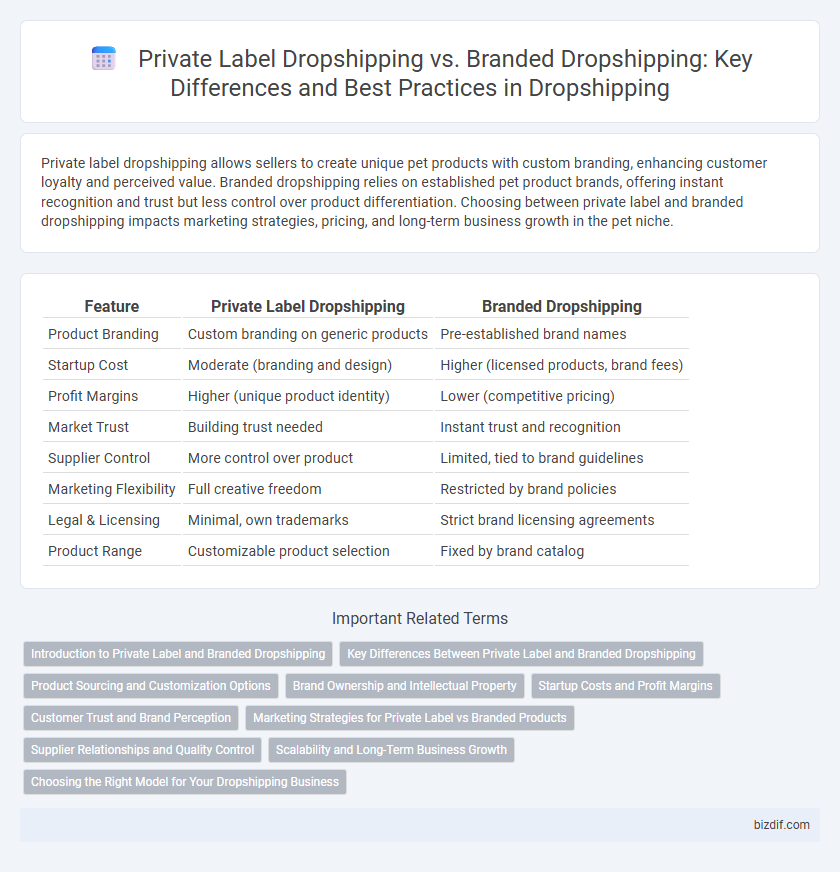Private label dropshipping allows sellers to create unique pet products with custom branding, enhancing customer loyalty and perceived value. Branded dropshipping relies on established pet product brands, offering instant recognition and trust but less control over product differentiation. Choosing between private label and branded dropshipping impacts marketing strategies, pricing, and long-term business growth in the pet niche.
Table of Comparison
| Feature | Private Label Dropshipping | Branded Dropshipping |
|---|---|---|
| Product Branding | Custom branding on generic products | Pre-established brand names |
| Startup Cost | Moderate (branding and design) | Higher (licensed products, brand fees) |
| Profit Margins | Higher (unique product identity) | Lower (competitive pricing) |
| Market Trust | Building trust needed | Instant trust and recognition |
| Supplier Control | More control over product | Limited, tied to brand guidelines |
| Marketing Flexibility | Full creative freedom | Restricted by brand policies |
| Legal & Licensing | Minimal, own trademarks | Strict brand licensing agreements |
| Product Range | Customizable product selection | Fixed by brand catalog |
Introduction to Private Label and Branded Dropshipping
Private label dropshipping involves selling products manufactured by a third party under your own brand name, allowing for greater control over branding and customer loyalty. Branded dropshipping, by contrast, focuses on selling well-known, established brands directly, benefiting from their existing market reputation and trust. Both models offer unique advantages in inventory management and marketing strategies within the e-commerce ecosystem.
Key Differences Between Private Label and Branded Dropshipping
Private Label Dropshipping involves selling generic products customized with your own branding, allowing greater control over product identity and pricing strategies. Branded Dropshipping focuses on reselling established brand products, leveraging their existing market reputation and customer trust but with limited influence on branding and profit margins. Key differences include control over product design, brand recognition, and potential for higher profitability in private label versus the quicker market entry and reliability of branded dropshipping.
Product Sourcing and Customization Options
Private Label Dropshipping allows sellers to source products directly from manufacturers and customize packaging, logos, and designs, creating a unique brand identity. Branded Dropshipping involves reselling established brand products with limited customization, relying on brand recognition and trust to drive sales. Product sourcing in Private Label involves deeper partnerships and quality control, while Branded Dropshipping focuses on inventory access and authorized distributor relationships.
Brand Ownership and Intellectual Property
Private label dropshipping grants entrepreneurs full brand ownership and control over intellectual property, allowing customization of product design, packaging, and trademarks to build unique brand equity. In contrast, branded dropshipping involves selling established brands without ownership rights, limiting control over branding and exposing sellers to stricter trademark regulations and potential supply restrictions. Securing intellectual property rights in private label dropshipping enhances long-term business value and protects against trademark infringement risks.
Startup Costs and Profit Margins
Private label dropshipping requires higher startup costs due to product customization and branding expenses but offers significantly higher profit margins by creating unique, market-differentiated products. Branded dropshipping involves lower initial investment since products are pre-made and sourced directly from established brands, yet profit margins tend to be narrower due to strong competition and fixed pricing. Entrepreneurs should weigh the trade-off between upfront investment and long-term profitability when choosing between private label and branded dropshipping models.
Customer Trust and Brand Perception
Private label dropshipping fosters stronger customer trust by offering unique products under an exclusive brand, enhancing perceived value and authenticity. Branded dropshipping relies on established brand recognition, which can simplify trust-building but limits differentiation and customer loyalty. Consumers often associate private label products with higher quality control and personalized experiences, contributing to improved brand perception over generic branded offerings.
Marketing Strategies for Private Label vs Branded Products
Private label dropshipping marketing strategies emphasize building a unique brand identity through custom packaging, personalized customer experiences, and targeted social media campaigns to foster brand loyalty. Branded dropshipping relies heavily on leveraging the existing reputation and trust of established brands, using influencer partnerships and premium advertising to attract customers. Effective private label campaigns focus on differentiating products and storytelling, while branded dropshipping prioritizes visibility and credibility to drive sales.
Supplier Relationships and Quality Control
Private label dropshipping requires close collaboration with manufacturers to ensure product customization and consistent quality control, fostering stronger supplier relationships through direct communication and tailored production. Branded dropshipping relies on established suppliers with recognized brand standards, often limiting direct oversight but benefiting from the reputation and fixed quality protocols of the brand. Effective supplier relationship management and rigorous quality assurance are critical in private label models to maintain product integrity, while branded dropshipping emphasizes trust in the brand's existing quality control systems.
Scalability and Long-Term Business Growth
Private label dropshipping offers greater scalability by allowing sellers to create unique products and control branding, which enhances customer loyalty and supports sustainable long-term growth. Branded dropshipping relies on established brand recognition, limiting flexibility but benefiting from immediate market trust and faster initial sales. For lasting business expansion, private label strategies provide stronger differentiation and the potential for higher profit margins through exclusive product offerings.
Choosing the Right Model for Your Dropshipping Business
Private Label Dropshipping offers greater control over product quality and branding, allowing entrepreneurs to build a unique identity and customer loyalty, while Branded Dropshipping leverages established brand reputation to attract customers quickly with less risk. Selecting the right model depends on market research, target audience preferences, and long-term business goals, weighing factors such as initial investment, competitive advantage, and scalability. Successful dropshipping entrepreneurs evaluate product customization potential and brand recognition to maximize profitability and sustain growth in a competitive e-commerce landscape.
Private Label Dropshipping vs Branded Dropshipping Infographic

 bizdif.com
bizdif.com